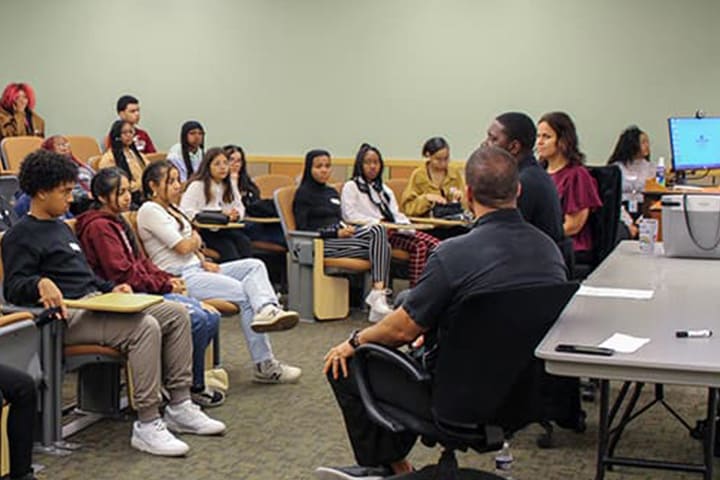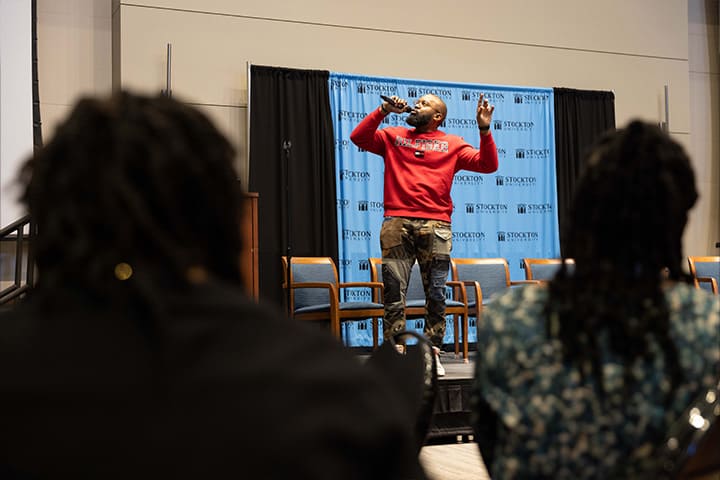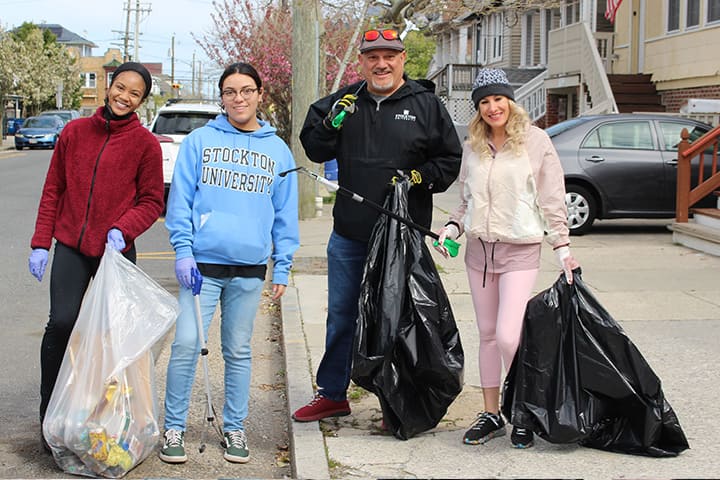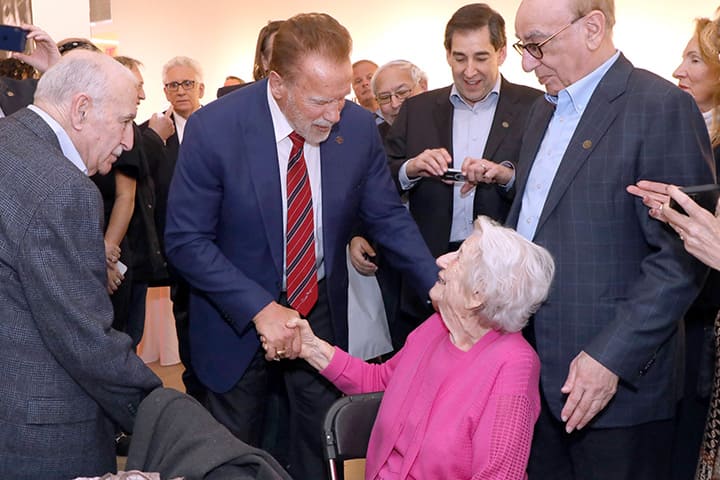Diversity & Inclusion

Diversity & Inclusion
Stockton accepts its responsibility to create and preserve an environment that is free from prejudice and discrimination and to take actions that affirm our commitment to inclusivity and diversity.
Conference Emphasizes Importance of Teachers of Color
A study found that over 50 schools in New Jersey don’t employ a single teacher of color, even though, according to the New Jersey Education Association (NJEA), students of color make up over 50% of state schools.
In response to the wide disparity, faculty members Stacey Culleny and Meg White of the School of Education created an all-day conference for high school students to promote the field of education.
The Future Teachers of Color Conference came to fruition May 17 with more than 200 local students in attendance.

The conference included breakout sessions where students learned about the significance of teacher-student relationships from two-time Stockton alumna (and current doctoral candidate for the Ed.D. program) Brenda Brathwaite of the Atlantic City School District and the power of coaching, advising and mentoring by Cynthia Sanchez-Munoz, Tim Watson and Randy Dean of Cedar Creek High School.
Unity Day Focuses on Leadership, Decolonization and Studying Abroad
The Social Justice & Education subcommittee of the Committee on Campus Diversity and Inclusion Excellence (CCDIE) hosted the annual Unity Day conference on March 30.
The theme for this year’s event was “Unity in Global Education,” and topics included:
- Promoting solutions to social issues.
- Exploring strategies for promoting global education.
- Interrogating colonization through exploring decolonization.
“Stockton’s Unity Day celebration is an impetus for how we move forward and how we think about unity,” said Guia Calicdan-Apostle, an associate professor of Social Work. “As a co-convener for CCDIE and convener of the Social Justice & Education subcommittee, I’m passionate about unity. The world is in chaos all of the time, so today is the day when we can be actively connected with each other as human beings. All of this is intentional.”
In her virtual presentation, “Strategies for Shifting Mindsets for Readiness in Global Transformational Change,” Sequetta Sweet, assistant professor of Organizational Leadership, talked about understanding diversity, equity and inclusion (DEI), social change, and how that work requires “a change in each of us individually to reach the collective.”

After acknowledging that her in-person presentation was taking place on Lenni-Lenape land, Calicdan-Apostle presented “Working Toward Decolonization and Reconstruction in Higher Education: Small Steps or Giant Leap?”
In her presentation, she defined decolonization as “a process of deconstructing colonial ideologies of the superiority and privilege of Western thought and approaches through collective action.” In other words, decolonization is the practice of calling out settler-colonialist thinking and actions and therefore dismantling them through careful examination and reclaiming lost Indigenous practices.
Following a talk and musical performance from Passport Rav, a panel of faculty, staff and students offered perspectives on studying abroad.
Embedded in the Fabric of America: Why Race Still Matters
Faculty members from the Africana Studies, Education and Political Science programs hosted a panel discussion centering on the idea of race and racism in the Campus Center Theatre on Feb. 16.
The panel discussion, “Why Race Still Matters,” was moderated by Patricia Reid-Merritt, distinguished professor of Social Work and Africana Studies. After introducing the panelists, Reid-Merritt gave a historical perspective on how race and racism developed over time and continue to “shape our experience here in (the United States of) America.”
“Race is embedded in the fabric of American culture,” Reid-Merritt said. “And for those, even today, who are raising questions about why we’re still talking about race, it’s because we cannot not talk about race. It is one of those things that determine the quality of your life, where you might be located and the positions or statuses of your life.”
Discussions like this are routine for Reid-Merritt, who proclaims herself as a “child of the Civil Rights Movement.” It’s her hope that, by continuing these conversations in R1 and R2 courses, Stockton University students will walk away with invaluable knowledge of social justice.
The panelists all had varying perspectives surrounding conversations on race, which made for a well-rounded discussion.
Stockton Atlantic City Community Day Wins State Award
The inaugural Stockton Community Day Clean Up and Party in the Park was a huge success in April 2022 and the event’s substantial work around Atlantic City was recognized by the New Jersey Communities Council.
More than 500 volunteers, representing over 80 community groups and organizations, collected more than 360 bags of trash at various locations throughout Atlantic City during the 2022 clean up. The event returned April 22.
Three of the event’s organizers — Brian K. Jackson, chief operating officer, Atlantic City Campus; Michael Cagno, executive director of the Noyes Museum; and Stephanie Clineman, professional services specialist — received the council’s Public Lands Cleanup Award on March 9 during the 18th annual New Jersey Clean Communities Awards reception in Atlantic City.
The award is for a business, community organization, school or individual who has cleaned a roadway, park, playground, ball field or other parcel of land.

Nearly $800K Grants Promote K-12 Computer Science
Twenty-six years ago, Stockton University started the Educational Technology Training Center (ETTC) to create a regional network among school districts to improve education through technology.
That mission came full circle last fall with a $333,313 grant from the state to create a new K-12 Computer Science regional hub, said Patty Weeks, the director of the Southern Regional Institute and ETTC in the School of Education at Stockton.
“It’s time for the next step — making sure teachers and students can use the technology to create the ideas, the codes, that can support the development of computer science,” Weeks said.
The money, which is part of a two-year grant, comes from a mandate by Gov. Phil Murphy in 2020 to commit funds to “promote equitable and expanded access to high-quality, standards-based computer science education for all New Jersey K-12 students in preparation for postsecondary success.”
These funds resulted in nearly 400 K-12 teachers across South Jersey being introduced to computer science during the school year by establishing a regional hub by the Educational Technology Training Center (ETTC) at Stockton University.
The center will continue to train teachers thanks to an additional $444,445 grant from the state, Weeks said.
“Teachers explore Unplugged Computer Science, Physical Computing, Robotics, Artificial Intelligence and the new student learning standards for computer science in New Jersey,” she said. “The teachers love it because they learn that it’s not just about coding. It’s about teaching their students to first consider a problem and then to find a solution. It isn’t always about writing a line of computer code.”
Schwarzenegger Brings Message of Strength Against Hate
Arnold Schwarzenegger has spent most of his life helping people build their strength.
“Your muscles only grow from resistance. It wasn’t easy. It was uncomfortable. Your mind and character are no different than your body and muscles,” the former bodybuilder told Stockton University students and guests during his presentation centered on terminating hate March 6.
“It is easier to hate than it is to learn. Easier isn’t better,” said Schwarzenegger, star of several blockbuster films including "Twins," "Kindergarten Cop" and "Predator."
More than 600 students, faculty, staff and invited guests, including Holocaust survivors and their families, turned out to hear Schwarzenegger’s message.

He began his visit at the Sara & Sam Schoffer Holocaust Resource Center on Stockton’s Galloway campus, where he met with local Holocaust survivors and their families and learned about the internationally recognized center, which preserves and shares the history of the Holocaust and life stories of South Jersey survivors.
Schwarzenegger was born in Austria two years after World War II to a former Nazi soldier. Since serving as 38th governor of California, Schwarzenegger has been outspoken about fighting antisemitism and hate. Last September, he toured the Auschwitz concentration camp in Germany.
“How do we stop this from happening again? After a visit to Auschwitz, you will never question why ‘never again’ is a valid cry of the people who fight to prevent another Holocaust.
“Today, I don’t want to preach to the choir. I want to talk to the people out there who may have stumbled on their path. … I want to talk to you if you found yourself thinking anyone is inferior or out to get them because of their religion or color of skin.
“I’ve seen people throw away their future because of hateful beliefs,” he said, calling his father “a broken man who had to drink to numb the pain.”
Instead, Schwarzenegger encouraged the audience to choose a life of strength.
“It’s not easy to look in the mirror and change your own life. Discomfort is how we grow strong,” he said. “You have to struggle to build strength.”
Schwarzenegger said he was impressed with Stockton’s work. “Stockton University is known for its work studying the Holocaust and fighting hate and fighting for inclusion,” he said.
Then-president Harvey Kesselman presented Schwarzenegger with an honorary Doctor of Public Service degree. “This morning, we honor an individual whose artistic career, dedication to public service and extensive philanthropy exemplify Stockton’s values. He is one of the most extraordinary individuals of our time, whose commitment and success in the entertainment industry, and his government, public policy and non-profit work has earned him a place among Stockton’s,” Kesselman said.
Spotlight On: Faculty Focus on DEI in Esports at Conference
Five Stockton faculty members presented at the 60th Annual Meeting of the Eastern Academy of Management (EAM), the regional division of the Academy of Management, held May 16-19 in Philadelphia. The jubilee anniversary of EAM focused on "Towards Justice and Equity in an Unequal World."
The conference included tracks for conceptual, empirical papers, panels, symposia and posters that undergo a rigorous double-blind review process. This year, Stockton was strongly represented in various tracks and continues to pioneer in esports and program development.
Noel Criscione-Naylor, chair of Esports Management, interim chair of Hospitality, Tourism and Event Management, and associate professor, presented "Building Diversity, Equity, and Inclusion into Esports Curriculum and Communities" with colleagues Jennifer Aarons, teaching specialist of Hospitality, Tourism and Event Management, and Esports Management; Petar Dobrev, assistant professor of Business Studies-Finance, Monica Amadio, teaching specialist of Business Studies-Management; and Demetrios Roubos, Stockton's information security officer and esports program manager.
During their panel, they introduced business academics and administrators to the multiple perspectives surrounding DEI in esports from numerous perspectives, including the current state of esports and as a developing field of academic study, the esports ecosystem, curriculum, student programs and entrepreneurship. In addition, the team focused on opportunities to reframe esports DEI discourse and critically engage with industry development practices.



